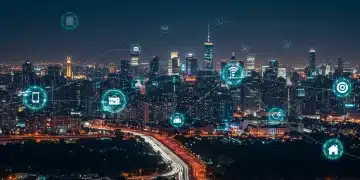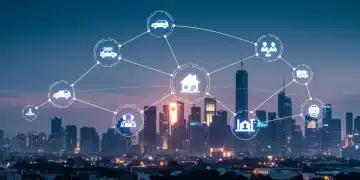Creator Economy 2025: Monetize Passion Online

The creator economy monetization 2025 is rapidly transforming how individuals earn a living, with new platforms and strategies emerging to empower content creators globally. This report provides timely, factual information on key trends, monetization avenues, and what creators need to know now to thrive in this evolving digital landscape.
The Rise of the Creator Economy: Monetize Your Passion Online in 2025 is not just a buzzword; it’s a fundamental shift in how value is created and exchanged digitally. As we approach 2025, new dynamics are shaping this burgeoning sector, offering unprecedented opportunities for individuals to transform their passions into sustainable income streams. Understanding these shifts is crucial for anyone looking to build or expand their presence online.
The evolving landscape of digital content creation
The digital content creation landscape is undergoing a significant transformation, moving beyond traditional advertising models to embrace more direct and diversified revenue streams. Creators are increasingly leveraging personal brands and niche communities to build loyal audiences, which in turn opens up various monetization avenues that were less accessible just a few years ago. This evolution is driven by technological advancements and changing consumer behaviors.
Platforms are continuously innovating, introducing new tools and features designed to support creators. This includes enhanced analytics, improved content distribution, and more robust monetization options. The focus is shifting from simply attracting eyeballs to fostering deeper engagement and community building, recognizing that a dedicated audience is a creator’s most valuable asset. This shift empowers creators to take greater control over their careers and financial futures.
Key drivers of growth
- Technological advancements: AI-powered tools, VR/AR, and blockchain are simplifying content creation and opening new immersive experiences.
- Audience demand for authenticity: Consumers increasingly seek genuine, relatable content from individuals rather than traditional media outlets.
- Decentralization of platforms: Emerging Web3 technologies promise creators more ownership and control over their content and data.
- Diversified revenue streams: Beyond ads, subscriptions, digital products, and direct patronage are becoming standard.
The growth of the creator economy monetization 2025 is also fueled by a cultural movement towards entrepreneurship and self-employment. More individuals are opting out of traditional employment to pursue careers that align with their personal interests and values. This trend is particularly prevalent among younger generations who have grown up with digital platforms and understand their potential for both creative expression and financial independence.
Monetization strategies for creators in 2025
In 2025, successful creators are employing a multifaceted approach to monetization, moving away from relying on a single income source. Diversification is key, as it provides stability and resilience against algorithm changes or platform shifts. Creators are strategically combining various methods to maximize their earning potential and build a sustainable online business.
Subscription models, for instance, have seen a significant surge in popularity. Platforms like Patreon, Substack, and YouTube Memberships allow creators to offer exclusive content or perks to paying subscribers, fostering a direct relationship with their most loyal fans. This model provides predictable recurring revenue, which is invaluable for long-term planning and investment in content quality.
Direct fan support and patronage
- Patreon and Buy Me a Coffee: Platforms enabling recurring or one-time donations from fans for exclusive content or early access.
- Twitch Subscriptions and Bits: Live streamers benefit from viewer subscriptions and virtual currency tips during broadcasts.
- YouTube Memberships: Channels offer tiered memberships with unique badges, emojis, and members-only content.
Beyond direct support, the sale of digital products and merchandise continues to be a robust monetization strategy. This includes e-books, online courses, presets, templates, and physical merchandise like apparel or custom prints. These products allow creators to leverage their expertise and brand identity, offering tangible value to their audience while generating significant revenue. The creator economy monetization 2025 emphasizes strategic product development aligned with audience needs.
The role of AI and automation in content creation
Artificial intelligence and automation are no longer futuristic concepts but essential tools for creators aiming to optimize their workflows and enhance content quality. In 2025, AI is playing a pivotal role in various stages of content production, from idea generation and scriptwriting to video editing and audience analytics. This integration allows creators to focus more on their core creative process and less on repetitive tasks.
AI-powered editing software, for example, can automatically generate captions, remove filler words, and even suggest optimal cuts, drastically reducing post-production time for video creators. Similarly, AI writing assistants help bloggers and writers overcome creative blocks and refine their prose, ensuring consistency in tone and style. These tools are democratizing high-quality content creation, making it accessible to a broader range of individuals.
AI applications for creators
- Content generation: AI writing tools assist with outlines, drafts, and even full articles or scripts.
- Video and audio editing: Automated transcription, captioning, noise reduction, and smart editing features.
- Personalized recommendations: AI algorithms help platforms recommend content to the right audience, boosting discoverability.
- Audience analytics: AI provides deeper insights into audience behavior, preferences, and engagement patterns.
Automation extends beyond AI, with tools that manage social media scheduling, email marketing, and customer service. By automating these routine tasks, creators can allocate more time to strategic planning, community engagement, and developing innovative content ideas. This efficiency is critical for scaling operations and maintaining a consistent presence in the competitive landscape of the creator economy monetization 2025.
Building a resilient creator business through community
In an increasingly crowded digital space, community building stands out as a cornerstone for a resilient creator business. A strong, engaged community not only provides a stable audience for content but also acts as a vital feedback loop, enabling creators to understand their audience’s needs and preferences better. This deeper connection fosters loyalty and encourages direct support, which is essential for sustainable growth.
Platforms like Discord, private Facebook groups, and even dedicated forums are becoming central hubs for creator communities. Here, fans can interact with each other and directly with the creator, building a sense of belonging and shared purpose. This engagement goes beyond passive consumption; it transforms followers into active participants and advocates, amplifying the creator’s reach and impact organically.

Strategies for community engagement
- Interactive Q&A sessions: Regular live streams or events where creators directly answer audience questions.
- Exclusive content and early access: Rewarding loyal community members with special perks.
- Collaborative projects: Involving the community in content creation or decision-making processes.
- Personalized communication: Responding to comments, messages, and fostering a genuine connection.
A resilient creator business also means diversifying platforms and not being solely reliant on one social media giant. While a primary platform might be where a creator initially gains traction, cross-promotion and audience migration to owned channels, such as email lists or personal websites, are crucial. This strategy mitigates risks associated with platform policy changes or algorithmic shifts, ensuring direct access to the audience regardless of external factors, reinforcing the importance of creator economy monetization 2025 strategies.
Emerging platforms and technologies for creators
The technological landscape for creators is continuously evolving, with new platforms and technologies emerging that promise to redefine how content is created, distributed, and monetized. Staying abreast of these innovations is vital for creators looking to maintain a competitive edge and explore novel ways to engage their audience and generate revenue. The creator economy monetization 2025 is heavily influenced by these technological advancements.
Web3 technologies, including blockchain and NFTs, are gaining traction as potential game-changers. NFTs, or non-fungible tokens, allow creators to tokenize their digital assets, offering unique ownership to fans and opening new avenues for digital collectibles and exclusive content access. This model empowers creators by giving them more control over their intellectual property and a direct share in the resale value of their work.
Key technological shifts
- Web3 and NFTs: Enabling true digital ownership and new forms of monetization through unique digital assets.
- Metaverse platforms: Offering immersive virtual spaces for creators to host events, build experiences, and sell virtual goods.
- Short-form video dominance: Platforms like TikTok and YouTube Shorts continue to drive engagement and discoverability.
- Audio-first content: Podcasts, audio dramas, and interactive audio experiences are expanding reach and engagement.
Beyond Web3, the metaverse is presenting exciting opportunities for creators to build immersive experiences and virtual worlds where audiences can interact. From virtual concerts and art galleries to interactive games and educational environments, the metaverse offers a new frontier for creative expression and monetization. Creators who adapt early to these emerging technologies will be well-positioned to capture new audiences and revenue streams in the coming years, shaping the future of creator economy monetization 2025.
Navigating legal and ethical considerations
As the creator economy expands, so too does the complexity of legal and ethical considerations. Creators must navigate issues such as copyright, intellectual property, data privacy, and advertising regulations to protect themselves and their audience. Ignorance of these laws can lead to significant financial penalties or reputational damage, making legal literacy a critical skill for any successful creator in 2025.
Copyright infringement, for example, is a prevalent issue, particularly with music, images, and video clips. Creators must ensure they have the proper licenses or permissions for any third-party content they use. Similarly, transparency in sponsored content and affiliate marketing is legally mandated in many regions, requiring clear disclosures to prevent misleading audiences. The FTC, for instance, has strict guidelines in the U.S. regarding endorsements and testimonials.

Essential legal and ethical practices
- Copyright protection: Registering original works and understanding fair use principles.
- Privacy policies: Clearly communicating how audience data is collected and used, especially for email lists or membership sites.
- Disclosure of sponsorships: Transparently labeling sponsored content, affiliate links, and gifted products.
- Terms of service compliance: Adhering to platform-specific rules and guidelines to avoid account suspension.
Ethical considerations extend to responsible content creation, particularly regarding misinformation, hate speech, and audience well-being. Creators have a moral responsibility to ensure their content is accurate, respectful, and does not promote harmful narratives. Building trust with an audience relies heavily on maintaining high ethical standards. As the creator economy monetization 2025 matures, platforms and regulatory bodies are expected to intensify their oversight, making adherence to these principles even more critical.
Strategies for sustainable growth and impact
Achieving sustainable growth and making a lasting impact in the creator economy requires more than just viral content; it demands strategic planning, continuous adaptation, and a deep understanding of one’s audience. Creators in 2025 are focusing on building long-term relationships and creating evergreen content that provides enduring value, rather than chasing fleeting trends. This approach ensures consistent engagement and revenue over time.
Content repurposing is a powerful strategy for sustainable growth. A single piece of long-form content, such as a podcast episode or a YouTube video, can be broken down into multiple short-form clips for TikTok or Instagram Reels, transcribed into a blog post, or adapted into an email newsletter. This maximizes the reach and impact of each creation, reducing the constant pressure to produce entirely new content.
Long-term growth tactics
- Niche specialization: Focusing on a specific topic or audience to build deep expertise and authority.
- Cross-platform promotion: Leveraging multiple platforms to reach diverse segments of the audience.
- Collaboration with other creators: Expanding reach and introducing content to new audiences through partnerships.
- Continuous learning and adaptation: Staying updated with industry trends, tools, and audience preferences.
Impact, for creators, often extends beyond financial success to include influence and positive change. Many creators are leveraging their platforms to advocate for causes they believe in, educate their audience, or inspire positive action. This not only fulfills a personal mission but also strengthens their brand and deepens their connection with an audience that shares similar values. The creator economy monetization 2025 is increasingly intertwined with purpose-driven content, demonstrating that passion can indeed drive both profit and profound influence.
Key Aspect |
Brief Description |
|---|---|
Monetization Diversity |
Multiple income streams (subscriptions, digital products, ads) are crucial for stability. |
AI & Automation |
Tools for efficiency in content creation, editing, and analytics. |
Community Building |
Fostering loyal audiences through engagement platforms like Discord and private groups. |
Web3 & Metaverse |
Emerging technologies offering new ownership and immersive experiences. |
Frequently Asked Questions about the Creator Economy in 2025
In 2025, creators primarily monetize through subscriptions (Patreon, YouTube Memberships), direct fan support, digital product sales (e-books, courses), merchandise, advertising revenue, and increasingly, through Web3 technologies like NFTs. Diversification across these channels is crucial for financial stability and growth.
AI streamlines content creation by automating tasks like scriptwriting, video editing, and analytics. It helps creators optimize content for audience engagement and discoverability, leading to more efficient production and potentially higher monetization rates through better content performance and personalized recommendations.
Strong communities foster loyalty, provide direct feedback, and offer consistent support, which is vital for a creator’s long-term sustainability. Engaged communities are more likely to subscribe, purchase products, and advocate for the creator, reducing reliance on algorithmic reach and external platforms.
Web3 technologies like NFTs enable creators to offer true digital ownership and new forms of monetization for their content. The Metaverse provides immersive virtual spaces for creators to build experiences, host events, and sell virtual goods, opening new frontiers for creative expression and audience interaction.
Creators must navigate copyright laws, intellectual property rights, data privacy regulations (e.g., GDPR, CCPA), and advertising disclosure requirements for sponsored content. Adhering to platform terms of service and maintaining transparency are crucial to avoid legal issues and build audience trust.
What happens next
As the creator economy continues its rapid expansion towards 2025, creators must remain agile and informed. The ongoing integration of AI, the evolution of Web3 technologies, and the increasing importance of community engagement will define success. Creators who prioritize diversified monetization, ethical practices, and continuous adaptation will not only monetize their passion online but also build resilient, impactful digital enterprises that shape the future of digital content and commerce.





